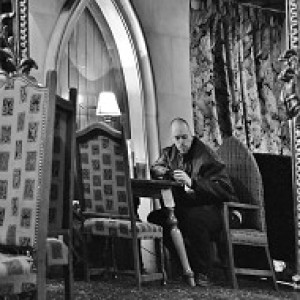Ain't That News
After my slightly horrendous day yesterday, today was like a godsend, at least in terms of blippable material. A mooch around the Cottage Museum yielded quite a few good captures, including this copy of The Times from Saturday, 11th February 1826. It's not a bad read, although I don't especially rate the girl showing her ankles on page three.
The front page begins by reporting on PARLIAMENTARY INTELLIGENCE, which is an oxymoron if ever I saw one. Friday's non-stop action in the House of Lords had seen the Earl of Shaftesbury (a Tory in favour of social reform, as unlikely as that may seem) deliver an impassioned speech against Negro slavery; the Earl of Carnarvon (a West Country Whig) deliver an equally impassioned speech against the importation of foreign silk and gloves on behalf of the people of Yeovil, which sounds about as riveting as speeches about gloves can possibly get; and the MPs who were still awake following that gem were rewarded by the Earl of Lauderdale waffling on about stamps for three hours.
Remarkably, the Earl of Lauderdale had lived a fairly interesting life up till that point. A self-styled radical in his youth, he had vocally supported the French Revolution, going so far as to show up to Parliament one day dressed as a Jacobin. After fighting a duel with Benedict Arnold (yes, that Benedict Arnold, for any Americans who happen to be reading), he took off for revolutionary Paris, where he became known as "Citizen Maitland", and hob-nobbed about with the likes of Jean-Paul Marat and Napoleon Bonaparte. Basically, he was the George Galloway of his day. And he ended up boring the arse off half of Parliament talking about stamps. Take note, George.
The paper moves on to the House of Commons next, where slavery was the major talking point. A Mr Byng (possibly George Byng, who later became 2nd Earl of Strafford) presented the house with a petition for the abolition of slavery on behalf of the people of Staines. Mr Pascoe Grenfell presented a similar petition from Penryn, as did the Lord Mayor and Common Council of London, who wished to "subscribe to indemnity the West Indians". The Lord Mayor also "prayed to be heard by counsel against any alteration in the course of the Basingstoke canal". Well, if you're off to Parliament for the day, I suppose you may as well kill two birds with one stone.
Much of the rest of the front page is taken up by the Tory Chancellor of the Exchequer, Frederick Robinson, talking at great length about the harsh measures he would be forced to institute to control the nation's debt, which had spiralled during the Napoleonic Wars, and had not fully recovered. These measures would eventually earn him the sarcastic nickname "Prosperity Robinson".
Nowt like a bit of history to take your mind off the present, eh?
- 0
- 0
- 7.2mp DigitalCAM
- 1/50
- f/2.8
- 6mm
- 100

Comments
Sign in or get an account to comment.


